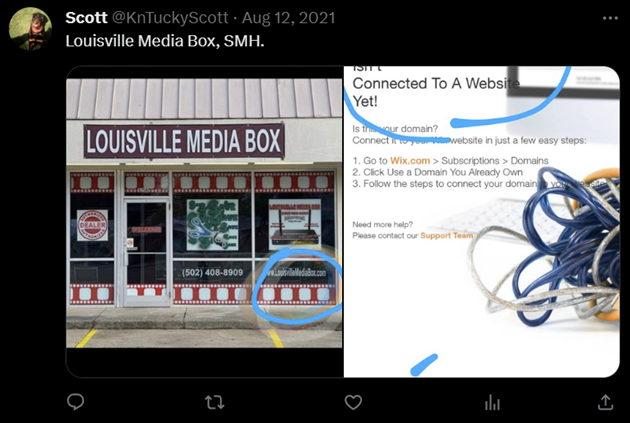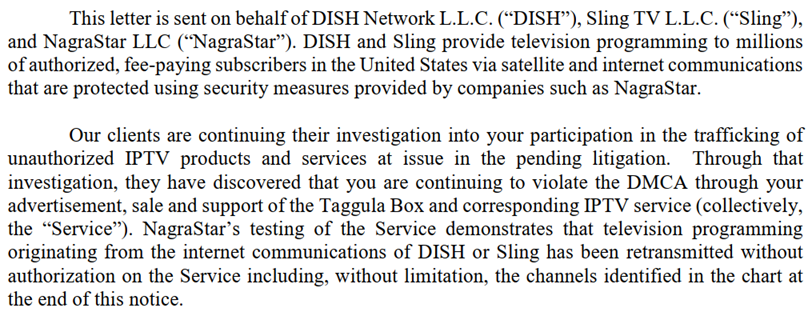After reporting on countless piracy lawsuits it's hard not to conclude that, from a human perspective, most are miserable affairs with regularly depressing outcomes. But then there's the lawsuit targeting two men behind Louisville Media Box, a one-stop shop for everything pirate IPTV. It appears to exist in a strange parallel universe where normal rules don't appear to apply.
In October 2021 when DISH Network filed yet another lawsuit against a pair of IPTV sellers in the United States, nothing stood out as particularly unusual.
The lawsuit named Kevin Hibdon and James Meadows, the alleged operators of Louisville Media Box, a local one-stop-shop catering to the community’s pirate IPTV needs.
Based on a simple Google search, the good people of Kentucky and indeed residents of any town or city on the planet, would’ve had no problem finding the business. It dominates search results, even today.

It’s possible that DISH Network discovered Hibdon and Meadows using a search engine, but it would make for a much better story had they’d heard or seen local celebrity @ShannonTheDude promoting the business on 95.7 QMF and 100.1 WKQQ weekdays 3-7pm and Kentucky Sports Radio 9-noon. Or on Twitter.
DISH and Sling Spoil the Party
On October 28, 2021, DISH and partner Sling filed a complaint at a Western District of Kentucky court. Targeting Hibdon and Meadows individually and collectively as Louisville Media Box, the plaintiffs claimed that the pair illegally broadcasted and resold their exclusive content through their own range of pirate streaming boxes.
The plaintiffs alleged that in doing so, the men repeatedly violated the DMCA. Count one claimed the men circumvented Sling’s technological measures, in violation of 17 U.S.C. § 1201(a)(1)(A). Count two alleged the pair trafficked in circumvention technology and services, in violation of 17 U.S.C. § 1201(a)(2).
Both men answered the complaint in November 2021. Their responses consisted mostly of denials, quite a few statements indicating a lack of knowledge, a scattering of affirmative defenses, and a concession that the plaintiffs had indeed sent cease and desist letters in both April and June 2021.
Meadows Wanted No Part of the Lawsuit
DISH served Meadows with its first set of interrogatories and requests for production on December 9, 2021, and followed up with a second set in February and March 2022. Meadows’ “wholesale refusal” to participate in the discovery process was problematic for DISH and also for his own counsel, who asked to be excused from his defense duties in April 2022.
A joint telephone conference was held on April 11, 2022, to discuss Meadows’ lack of cooperation in the presence of Magistrate Judge Regina Edwards. Meadows failed to participate – and then failed to comply with a court order to meet his discovery obligations.
After no-showing a status conference and becoming the subject of a third order, Meadows faced the threat of a default judgment. Surprisingly he then attended a show cause hearing, after which the court issued a fifth order insisting that he should take the discovery process seriously, or else.
Too Busy Selling Pirate IPTV to Respond
Early November 2022, DISH and Sling found themselves attempting to communicate with Meadows again. Contrary to any normal expectations, Meadows was apparently still in the pirate IPTV business, still violating the DMCA, and now in receipt of yet another cease-and-desist letter.

The plaintiffs’ letter complained about sales and support for an Android device known as Tanggula Box (also available on Amazon) and how it utilizes a service that provides DISH or Sling programming obtained after circumventing the company’s DRM. If we recall, both men were accused of circumventing DRM and trafficking in DRM circumvention devices.
The wall of text in the cease-and-desist seems standard enough, at least until consumed in manageable pieces:
Your involvement with regards to the Service, including your trafficking in the Service, STB, PSDs, Apps, Subscriptions and/or Device Codes, violates federal law including the Digital Millennium Copyright Act, 17 U.S.C. S 1201 (“DMCA”).
The DMCA prohibits circumvention of technological measures that control access to copyrighted works, such as the DRMs implemented technological measures that control access to copyrighted works, such as the DRMs implemented by DISH and Sling that are circumvented to obtain the Programming that is retransmitted without authorization on the Service.
You violate [the trafficking] provision of the DMCA through your involvement with, and trafficking in, the Service because at least part of the Service is designed, produced, and has no purpose or use other than to circumvent the DRMs that protect the Programming.
The key takeaway here is that while the men were accused of trafficking in circumvention devices, they were also accused of direct circumvention. There’s no mention of circumvention here.
It’s also worth highlighting that in the original complaint under the heading “Unauthorized Rebroadcasting of Plaintiffs’ Programming” it was alleged that one of “defendants’ streaming services” was PrimeStreams. A separate lawsuit against PrimeStreams was dismissed in mysterious circumstances earlier this year and as far as we’re aware, no mention was made of Hibdon or Meadows in that matter.
Meadows Refuses to Comply
Despite being given the opportunity to dig into the complaint, Meadows failed to respond to the cease and desist. He followed that up with zero cooperation towards discovery.
Meadows had discussed producing documents with the court, including tax returns, set-top box sales records, and banking records. Production of information related to transfers of money to China, from where devices and content appear to have been acquired, also seemed to be on the agenda.
Then in an email to the plaintiffs’ counsel late November 2022, Meadows said that he was sorry he had been unable to help DISH more. The reason for that as per the email, is that Meadows and his family were “being threatened with death” and he would rather lose the copyright lawsuit than have his wife or his children “murdered.”
In response and in part due to his absence, the court struck Meadows’ answer and entered default against him. The plaintiffs demanded $7,424,000 in statutory damages and an injunction. Evidence to support that came in the form of Meadows’ financial records (how or where from is unclear), which claimed to show 7,424 violations of the DMCA, a figure that was later reduced to 5,816.
Hibdon Checks Out
Early March 2023, via an agreed motion for final judgment and permanent injunction, Hibdon left the lawsuit behind. Judgment was entered against Hibdon on count two of the complaint, trafficking in circumvention devices. No mention was made of count one, circumvention itself.
Via the agreed motion, the plaintiffs were awarded damages of $1,102,500 against Hibdon, and he was enjoined from redistributing, retransmitting, distributing, copying, reproducing, selling, marketing, and a dozen other acts related to the plaintiffs’ content, ever again.
Report and Recommendation
In a report and recommendation dated July 21, 2023, Magistrate Judge Regina Edwards presents a recap of the case thus far which at times feels somewhat puzzling.
When viewed from an obtuse angle, references to “rebroadcasting” the plaintiffs’ content “through their own streaming boxes” could suggest that set-top box receiving devices are also able to transmit. Even with some room for maneuver, it could imply that original streams were illegally obtained by the pair and then redistributed to their customers.
The judgment against Hibdon makes no mention of anything like that and appears to rely solely on sales of set-top boxes, aka trafficking. That wouldn’t make much sense if illegal streams were actually being obtained by the pair and then rebroadcasted.
The report notes that to succeed in their circumvention claim, the plaintiffs must show that a) they deployed technical measures to protect their work and b) Meadows worked to defeat them.
“Despite Plaintiffs’ DRM security, the Complaint states that Defendants sold devices, pre-loaded with access codes, that would circumvent these measures and retransmit Sling Programming without Plaintiffs’ authorization,” the report notes.
And here we are again; transmitting receivers.
Set-top boxes pre-loaded with access codes, that are able to defeat DRM, do actually exist. However, the claim that set-top boxes retransmit Sling’s programming is not explained in any detail. In a peer-to-peer system like BitTorrent, that might make sense, but in this context makes almost none.
Nevertheless, since the plaintiffs claimed to have observed unique identifiers in their content viewable on the set-top boxes, the report found that evidence enough of Meadows himself having circumvented the plaintiffs’ DRM, in violation of the DMCA, something it appears Hibdon did not.
Damages Recommendation
On trafficking in circumvention devices, Meadows didn’t stand a chance. Failing to turn up to defend himself didn’t help, neither did an earlier comment to the plaintiffs along the lines of “Go get your default.”
It was originally alleged that Meadows committed 7,424 violations of the DMCA. If he’d attended court he could’ve done the work the Judge was good enough to do for him. The manner in which some violations were considered or calculated led to the plaintiffs reducing violations down to 5,816 and damages to $5,816,000, considerably less than the $7,424,000 amount originally requested.
Ultimately a review by the Court found that ‘only’ 5,735 violations were considered valid, leading to a recommendation of a $5,735,000 default judgment and a permanent injunction, in part because “Meadows has brazenly continued to sell these codes after this suit commenced.” (pdf)
In the face of what is likely to be a ruinous end to this lawsuit, it’s difficult to fathom what would drive someone to openly continue the same conduct before the axe has fallen. What makes even less sense is having @ShannonTheDude promote the business on public radio and then announce a huge influx of new members.
Whether it’s the fresh Kentucky air, a high concentration of invisible bourbon fumes, or something else, that’s not one but three lawsuits in Kentucky involving the same plaintiffs, plus IPTV providers, and sellers, that took an awfully long time to conclude, yet still managed to end up making very little sense.



3175x175(CURRENT).thumb.jpg.b05acc060982b36f5891ba728e6d953c.jpg)

Recommended Comments
There are no comments to display.
Join the conversation
You can post now and register later. If you have an account, sign in now to post with your account.
Note: Your post will require moderator approval before it will be visible.